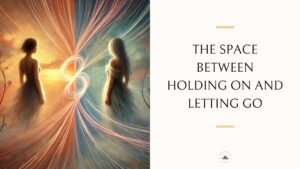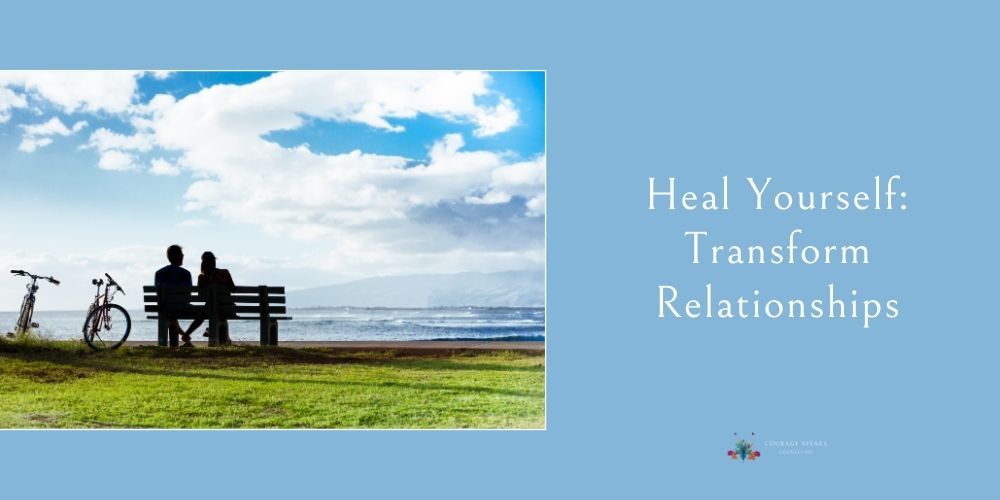One of the most profound truths of healing is this: when we reconnect with ourselves, the relationships in our lives often shift without us needing to force change. The debate around whether to cut ties with family or stay connected becomes less about “them” and more about how we’re relating to ourselves.
When we’ve experienced pain, neglect, or harm in our family relationships, it’s natural to feel disconnected—not just from them, but from parts of ourselves. In these moments, we often protect ourselves by shutting down, distancing, or adapting to survive. This disconnection can feel necessary, but over time, it can also leave us feeling stuck, unsure whether to stay in relationships that hurt us or walk away.
But what if the key isn’t about choosing between cutting ties or staying connected? What if it’s about healing the disconnection within ourselves first?
Disconnection and Its Impact on Relationships
When we’re disconnected from ourselves, we often carry the unhealed wounds of our past into our present relationships. Old patterns of feeling unworthy, unheard, or unsafe can shape how we engage with others. We might:
• Avoid confrontation, fearing rejection or conflict.
• Overcompensate, trying to earn love or approval.
• Lash out or shut down when our boundaries are crossed.
These patterns often mirror the dynamics we experienced growing up, replaying unresolved pain in new contexts. This isn’t about blaming ourselves—it’s about recognizing that the way we relate to others often reflects how we relate to ourselves.
The Power of Reconnection
Healing begins when we turn inward with curiosity and compassion. When we stop disconnecting from our own emotions, needs, and boundaries, something remarkable happens: our relationships start to shift.
1. Understanding Ourselves Changes the Dynamic
When we reconnect with our emotions, we gain clarity about what we’re truly feeling and why. Instead of reacting out of old wounds, we can respond with intention. For example:
• Instead of blaming a family member for making us feel small, we might notice, This is touching an old part of me that feels unseen. What does that part need right now?
This self-awareness creates space for us to engage with the relationship differently.
2. Healing Our Wounds Changes Our Needs
When we address the parts of us that still carry unmet needs from childhood, we stop looking to others—especially family members—to fulfill them. This doesn’t mean we stop needing connection or support, but it means we approach relationships from a place of choice, not desperation.
For example, instead of needing a parent to finally acknowledge the pain they caused, we might find validation within ourselves, freeing us to interact with them from a more grounded place—or to decide that the relationship no longer serves us.
3. Boundaries Become Clearer
When we reconnect with ourselves, we gain a clearer sense of what we’re willing to tolerate and what we’re not. Boundaries become less about controlling others and more about protecting our own well-being. We might find that:
• Some relationships naturally improve as we assert healthy boundaries.
• Others fall away because they can’t meet us in our growth.
In either case, we’re no longer trying to force change; we’re simply aligning our relationships with our healing.
4. Compassion Becomes Possible
As we reconnect with our own pain, we often develop more compassion for others—especially family members who may be carrying their own unhealed wounds. This doesn’t excuse harmful behavior or mean we stay in relationships that hurt us. It simply allows us to see them as humans with their own struggles, rather than as villains in our story.
Compassion doesn’t always lead to reconciliation, but it can soften the edges of resentment and free us from carrying the weight of anger or blame.
When Relationships Change on Their Own
When we do the work of healing ourselves, the relationships in our lives often shift without us needing to make dramatic decisions. Some family members may rise to meet us in our growth, while others may pull away. Either way, these changes often feel more organic and less forced because they’re rooted in the work we’ve done to reconnect with ourselves.
For example:
• A sibling who once dismissed your feelings might begin to listen more closely as you assert your needs with calm clarity.
• A parent who always crossed your boundaries might start respecting them when they see how firmly and lovingly you hold them.
• A toxic relationship might naturally fade as you stop engaging in old patterns of people-pleasing or conflict.
These shifts don’t always happen, and not every relationship will survive the process of healing. But the relationships that do remain are often stronger, more authentic, and more fulfilling because they’re no longer built on the unspoken agreements of old wounds.
Healing Yourself, Freeing Your Relationships
The question of whether to cut ties with family or stay connected is often rooted in a desire to feel safe, loved, and whole. But these feelings don’t come from forcing relationships to change—they come from healing the relationship we have with ourselves.
When we stop disconnecting from our own emotions, needs, and boundaries, we naturally create space for healthier connections with others. And when those connections aren’t possible, we find the strength to step away—not out of anger or resentment, but out of love and care for ourselves.
Healing yourself doesn’t guarantee that every relationship will thrive. But it does guarantee that the relationships in your life—whether with family, friends, or yourself—will reflect the authenticity and care you’ve worked so hard to reclaim.
Embracing Shadows, Illuminating Hope,
Chelsey Fjeldheim, LCSW
Empowering Souls on the Path of Healing
Copyright © 2025 Chelsey Fjeldheim, Courage Speaks Counseling




